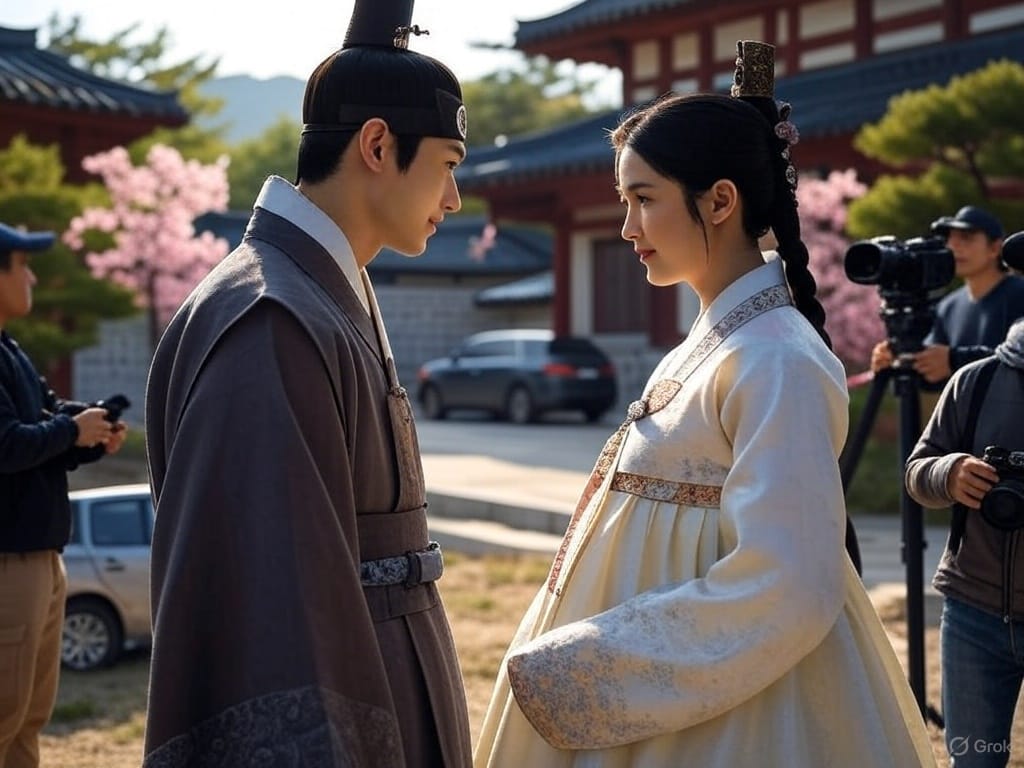
By Elke Porter | WBN News Global | May 15, 2025
The Korean drama (K-drama) industry has transformed into a billion-dollar global powerhouse, captivating audiences across continents with its emotional storytelling, compelling characters, and high production values. Fueled by streaming platforms like Netflix and a fervent international fanbase, K-dramas are now more influential than ever before.
Back in 2023, South Korea’s content industry—including K-dramas—was worth $79.19 billion (yes, with a B!). But by 2026, it’s expected to hit $86.4 billion because, let’s be real, nobody is getting over K-dramas anytime soon. That is an average annual growth rate of 4.26%, way better than the measly rate of my bank savings account.
According to the website "KDramas for Non Koreans", found here https://www.kdramafornonkoreans.com/, in 2022 alone, K-drama exports brought in $214.4 million—mostly thanks to streaming platforms making them ultra-accessible to fans who just can’t get enough.
K-dramas offer a distinct blend of authenticity and charm. Unlike many Western shows, where relationships can seem hurried or jaded, Korean dramas unfold at a slower pace—allowing emotional connections and romantic tension to grow naturally. With heartfelt storylines, layered characters, and rich cultural context, they create an experience that feels both deeply engaging and refreshingly sincere.
One of the genre’s early trailblazers was Boys Over Flowers (2009), often compared to America’s The O.C. in its cultural impact. The series helped launch the career of Lee Min-ho, who later starred in Pachinko. It follows Geum Jan-di, a determined teen from a modest background who earns a scholarship to a prestigious high school after saving a student from bullying. There, she encounters the wealthy and arrogant Gu Jun-pyo, heir to the Shinhwa Group, leading to 25 episodes of drama, romance, and personal growth.
More recently, Squid Game shattered global viewing records with its dystopian thriller premise and social commentary, redefining the possibilities of K-dramas on the world stage. Its gripping narrative and unforgettable visuals captivated millions, placing Korean storytelling firmly in the global spotlight.
Meanwhile, romantic comedies like Business Proposal have charmed audiences with their lighthearted tone and modern flair. Based on a popular webtoon, the show centers on Shin Ha-ri, who fills in for her friend on a blind date—only to discover the man across the table is her company’s CEO, Kang Tae-moo. The fake-dating trope unfolds into a heartwarming and hilarious tale of love and identity.
Netflix has played a pivotal role in amplifying K-drama’s reach in North America by investing in original productions and licensing fan-favorite series such as Crash Landing on You. However, the genre’s rising fame has also led to an uptick in impersonation scams, where fake social media accounts mimic stars like Lee Min-ho, Hyun Bin, and Song Joong-ki (Vincenzo), misleading unsuspecting fans on platforms like X (formerly Twitter) or TikTok.
Despite these challenges, the fan community remains vibrant and deeply engaged—sharing reviews, posting filming updates, and even catching stars in real life. During the pandemic, Lee Min-ho was spotted filming in Richmond, British Columbia, and even took time to meet fans in a Surrey park, much to their delight.
K-dramas highlight themes of family, resilience, and personal growth in ways that are a great introduction to Korean lifestyles for non-Koreans. They embrace tradition, culture, and deep emotional storytelling—something that feels refreshingly different to the average Western TV tropes.
Many K-dramas include a set of recurring Asian-related tropes that fans have come to expect—and adore. There’s the classic moment when the female lead cuts her finger while cooking, prompting the male lead to gently apply a bandage from his perfectly stocked first-aid kit, which somehow resembles a sleek toolbox. That simple act often turns into an unexpectedly romantic scene. Then there’s the inevitable sick-day scenario: he catches a cold, and she shows up with homemade porridge, earning his affection through care and warmth.
No K-drama would be complete without the disapproving, wealthy mother-in-law offering the heroine a blank check to disappear—usually met with quiet dignity and rejection. The male lead is often a chaebol heir unfamiliar with simple pleasures like ramen, street food, or hot pot until she introduces him to the world outside of luxury—and he’s instantly hooked. Rounding out the formula is the ever-loyal secretary: handsome, stylish, and hyper-competent, he does everything from driving and shopping to offering heartfelt advice. Often, he becomes an unexpected ally to the female lead, making these familiar story beats both comforting and entertaining.
From Descendants of the Sun to Legend of the Blue Sea, K-dramas continue to explore themes like love, bullying, social status, and mental health. As access expands through global streaming services, the K-drama phenomenon shows no signs of slowing down, uniting viewers from Seoul to Surrey in a shared love for Korean storytelling.
If you have never seen a Korean Drama before, now is the time to start.
#KDrama #KoreanDrama #SquidGame #LeeMinHo #NetflixOriginals #KoreanWave #BusinessProposal #GlobalKCulture #WBN News Global #Elke Porter
Connect with Elke at Westcoast German Media or on LinkedIn: Elke Porter or contact her on WhatsApp: +1 604 828 8788


